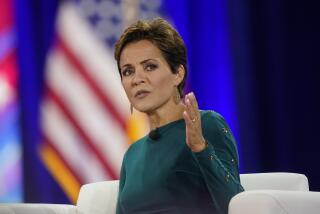Azusa Candidates Urged to Keep Race Clean
- Share via
AZUSA — City Clerk Adolph Solis, bemoaning recent elections involving more underhanded sniping than high-minded debate, laid down the law to City Council candidates who attended a special “election ground rules” meeting Tuesday.
Looking ahead to the April 12 election, Solis called the meeting to steer the campaign away from the petty personal politics that he said have dominated Azusa elections since 1984.
Saying the city is “one step away from becoming a Banana Republic,” Solis referred to instances of what he called dirty politics, sign vandalism, rumors and the “bitter and underhanded mood” of Azusa politics since the last council election. Solis provided no specifics but spoke of general trends.
“I’m not attacking anyone personally,” he said. “I’m unhappy with the whole mood of the election process.”
Solis said campaigns have deteriorated into “a mishmash of personal attacks” and likened them to “a loaded gun” with disaster in the offing.
“What we are are Americans,” he said, urging the candidates to expend all their energies to win votes. “Americans settle their differences at the ballot box.”
After his ethics lecture, five of the 11 candidates for city offices signed agreements to wage clean campaigns, joining the other six, who had signed them when they filed their candidate papers.
The April race for mayor pits incumbent Eugene Moses, 54, against Bruce Latta, 37, a councilman who sponsored a resolution a year ago to curtail the mayor’s powers and ban Moses from the employee refrigerator at City Hall.
Councilmen James Cook, 35, and Lucio D. Cruz, 64, are seeking reelection. They are being challenged by Mike Falletta, 37, a planning commissioner and gas company employee; Harry Stemrich, 57, a construction photographer, and three businessmen, Tony Narajo, 28, Conrad Bituin, 53, and Todd Baker, 23.
Solis, 57, and City Treasurer Robert Talley, 65, are unopposed.
In the 1984 election, Moses survived a challenge from Latta. Falletta and Stemrich were unsuccessful council candidates in 1986.
Solis said he hopes that his public admonishment and the candidates’ pledges to wage clean campaigns will bring more dignity to the election. But others, including two candidates, were skeptical.
Moses said that although he would like to see the level of the campaign rise, he expects it to be business as usual.
“I expect it to be the same,” he said. “From what I’ve seen in the past, I’d say it has to be the same.”
Dirty campaigns spring from a challenger’s inability to attack an incumbent’s solid record, Moses said.
“When they cannot attack a councilman through issues and debate, they attack the councilman himself.”
Latta, who pledged a campaign devoid of personal politics, said he would quell attacks from his opponent by ignoring them.
“You can’t have a fight if the other guy won’t fight,” he said. “I’m going to stick to the issues.”
But issues and personal politics often run together in Azusa.
In January, Latta persuaded the council to rescind the ordinance he had drafted to curtail Moses’ powers and restrict him from using the refrigerator at City Hall.
At the time, Latta said he wanted the ordinance rescinded to clear the air and prevent Moses from using it as a campaign issue. Latta, Cruz and Cook said they had passed the ordinance because the mayor overstepped his official powers.
Solis warned that vandalism of campaign signs, a frequent cause of accusations and counter-accusations, will probably continue this year. Although his office will try to police the situation, he told the candidates to watch their signs, which generally blanket the 9-square-mile city by mid-March in election years.
“Signs are going to be vandalized,” Solis said. “This time we’re going to tell everyone: ‘Mind your own.’ ”
Without identifying any offenders, Solis also warned candidates not to deface their own signs and campaign materials in an attempt to gain voters’ sympathy.
“Sooner or later (such a ploy) leaks out and comes back to me,” he said.
In the past, Solis said, he has tried to deal with instances of dirty politics quietly, contacting the candidates involved.
“I was trying to be polite about it, but it didn’t work,” he said.
After the meeting, Solis said he was heartened by the response and urged the candidates to take his appeal seriously.
“The election system is one of the last things we have based on honor, which is a fast-diminishing commodity around here,” he said.
More to Read
Sign up for Essential California
The most important California stories and recommendations in your inbox every morning.
You may occasionally receive promotional content from the Los Angeles Times.













